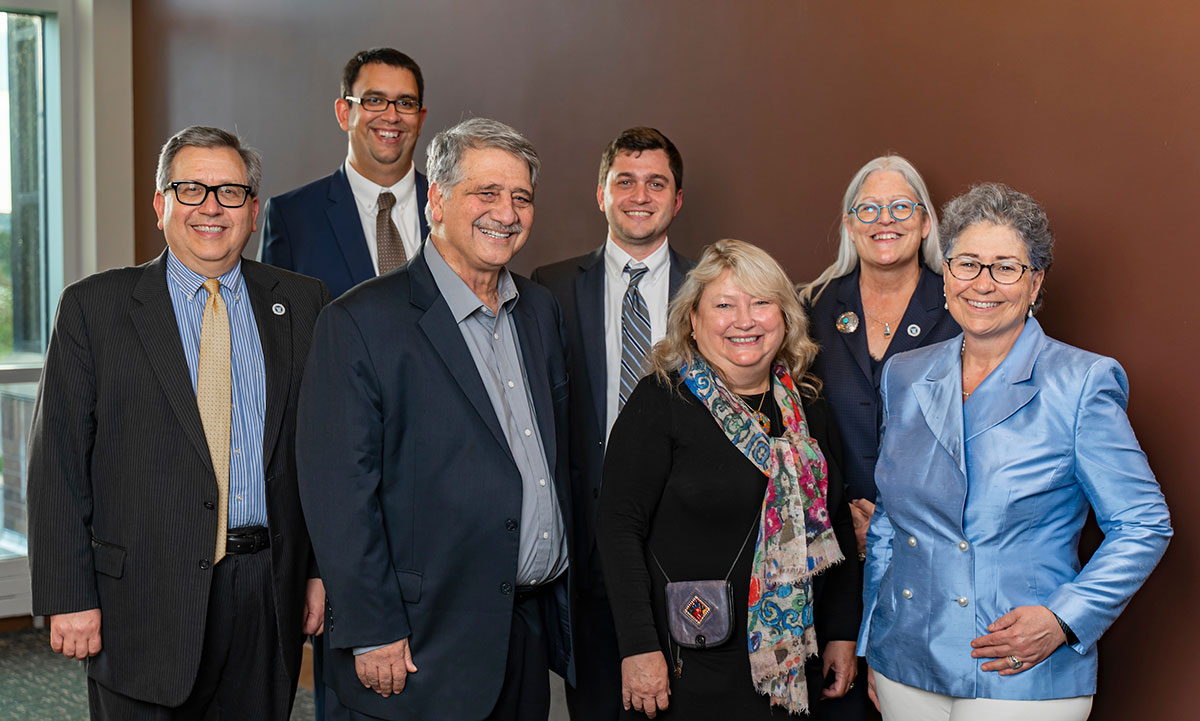
The State Bar of Wisconsin's Board of Governors held its first meeting of the fiscal year in Kenosha, engaged in other State Bar-related activties there, and met with local leaders. Pictured at the Civil War Museum in Kenosha, from left, State Bar Executive Director Larry Martin, Kenosha Bar Association President Zach Brost, Kenosha Mayor John Antaramian, State Rep. Tip McGuire, Immediate Past State Bar President Kathy Brost, State Bar President-elect Margaret Hickey, and current State Bar President Cheryl Furstace Daniels. Photo credit: Andy Manis.
Sept. 24, 2021 – Adopting and implementing a plan to address the shortage of lawyers in Wisconsin’s rural counties was a top agenda item at the State Bar of Wisconsin’s first board meeting of the fiscal year, held Sept. 23 in downtown Kenosha.
The State Bar Board of Governors’ meeting was one of several State Bar-related activities in Kenosha this week, including a
free expungement clinic at the Italian American Society, connecting volunteer pro bono attorneys with local residents.
The clinic was an opportunity for those with a criminal conviction or arrest record, including records containing false or inaccurate information, to learn more about their legal rights and eligibility to remove or seal that information from their records.
State Bar board, section, division, and committee leaders also had an opportunity to meet with Kenosha area leaders – including Kenosha Mayor John Antaramian, State Rep. Tip McGuire, and Kenosha Bar Association President Zach Brost.
The State Bar’s executive leadership chose Kenosha as the location of the September 2021 board meeting amid the events of summer 2020, including protests against police brutality and racial injustice in Kenosha following the Jacob Blake shooting.
Leadership consulted the Racial Justice Leadership Group in making that decision, concluding a Kenosha meeting presented an opportunity to engage local leaders and signaled the organization’s commitment to issues of racial justice.
Shortage of Rural Lawyers in Wisconsin
The State Bar’s 52-member Board of Governors (board) voted unanimously to implement recommendations identified in a
final report from a work group that studied how the State Bar could address the shortage of rural attorneys in Wisconsin.
Outgoing State Bar President Kathy Brost created the
Greater Wisconsin Initiative in 2019, as president-elect, to address a shortage of lawyers in “Greater Wisconsin,” defined as areas outside Madison, Milwaukee, and the Fox River Valley corridor.
The
final report from the
Greater Wisconsin Initiative Working Group notes that fewer than 40 percent of active lawyers in Wisconsin practice outside urban areas.
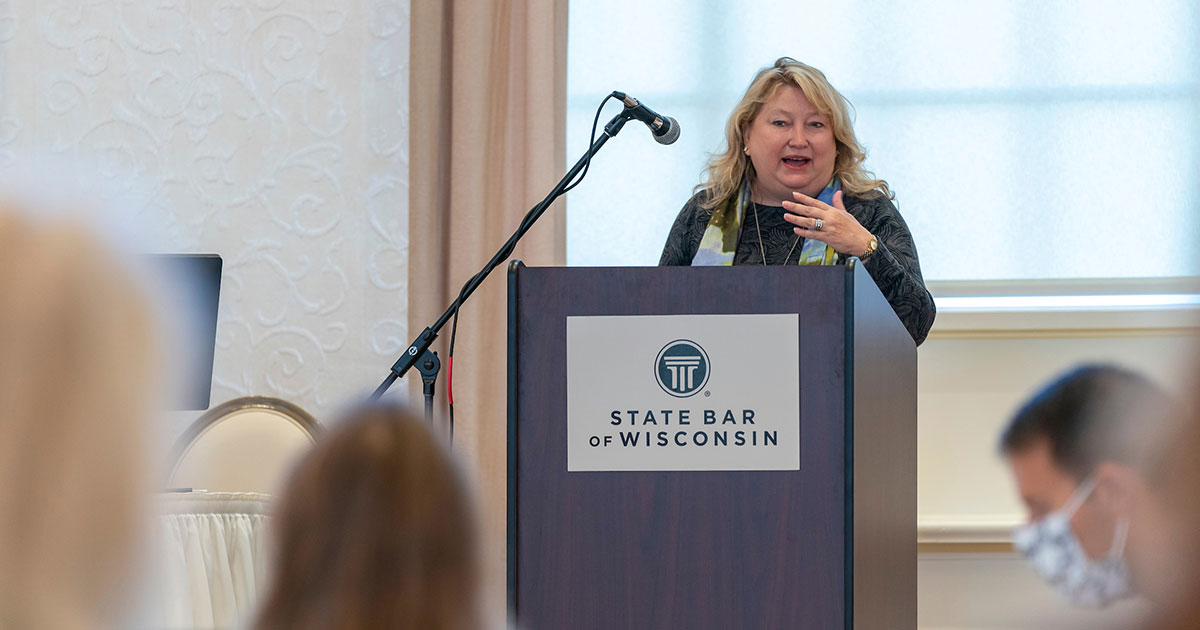
Immediate Past President Kathy Brost presented the final report from the Greater Wisconsin Initiative Working Group, which developed recommendations the State Bar can implement to address the shortage of lawyers in rural Wisconsin.
On average, most of them are over the age of 60 and “current trends indicate that these attorneys are not being replaced” as they retire.
The task force noted that the trend will only exacerbate what is already an access to justice problem in the rural counties of the state.
“The reality is stark and looming: the current status and trend towards less availability to legal professionals is a direct threat to the access, quality and fundamental processes and outcomes of our courts and judicial systems,” the final report notes.
The State Bar has engaged in a number of activities to promote rural practice, including a rural bus tour. But the task force says more must be done to draw younger attorneys to the outer parts of the state, noting many intangible reasons for where and why people choose to live and work in particular areas.
The report’s recommendations focus on tangible solutions and dispel perceptions about income levels in rural parts of the state.
The final report, which the board discussed at its last meeting in June and adopted yesterday (Sept, 23), recommends that the State Bar focus its future efforts on both short-term and long-term strategies, including outreach at an earlier stage.
For instance, increased awareness of the State Bar’s High School Mock Trial Program may give students in rural communities, who may choose to return to their home communities as professionals, more exposure to a potential legal career.
Other recommendations highlight technology to help attorneys expand their reach into rural areas through support for broadband legislation and court rules on videoconferencing, or incentives – such as loan forgiveness – to start practices there.
“This is an access to justice issue,” said Brost, now immediate past president. “It’s a large issue that can’t be fixed with a single approach or a single solution. But are various things the State Bar can do to address it and move in the right direction.”
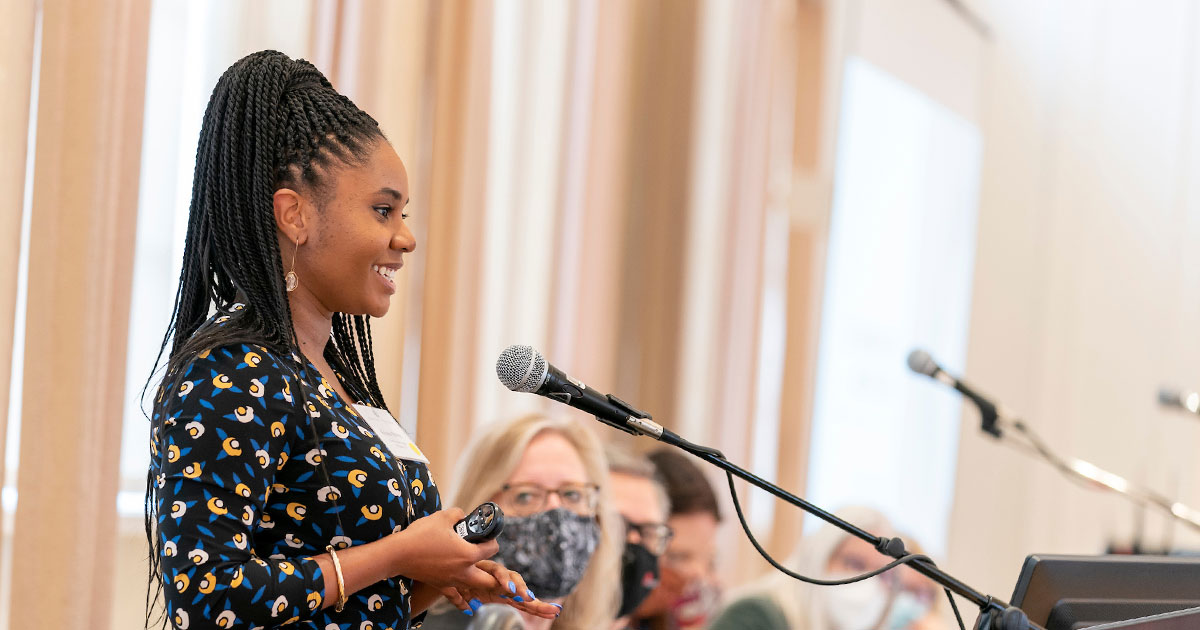
State Bar Secretry Kristen Hardy gives a presentation on State Bar leadership duties and expectations for new members of the Board of Governors.
Board Supports Proposed Rule on Remote Administration of Oaths Depositions
The board voted unanimously to support a proposed petition – drafted by the Wisconsin Association for Justice with input from other organizations – to allow for the remote administration of oaths at depositions on a permanent basis. A temporary rule that allows remote depositions expires on Dec. 1, 2021.
Facing the COVID-19 pandemic, the Wisconsin Supreme Court issued emergency orders that allow remote depositions without the necessary stipulation of parties.
The change would amend Wis. Stat.
804.03, which requires depositions to be taken “before an officer authorized to administer oaths.” Under normal circumstances, the parties must stipulate to the remote administration of oaths at depositions.
The proposed rule would include a provision that says an oath may be administered remotely if the officer administering an oath is in “simultaneous communication with all parties to the deposition, whether or not in the physical presence of any of them.”
In addition, the proposed rule change would specify that:
Court reporters qualified to administer an oath in the State of Wisconsin may administer an oath to a witness at a deposition remotely via audio-visual communications technology from a location within the State of Wisconsin provided the person administering the oath can see and hear the witness and can identify the witness; and
If a witness is not located within the State of Wisconsin, the witness may consent to being put on oath remotely via audio-visual communication technology by a court reporter qualified to administer an oath in the State of Wisconsin.
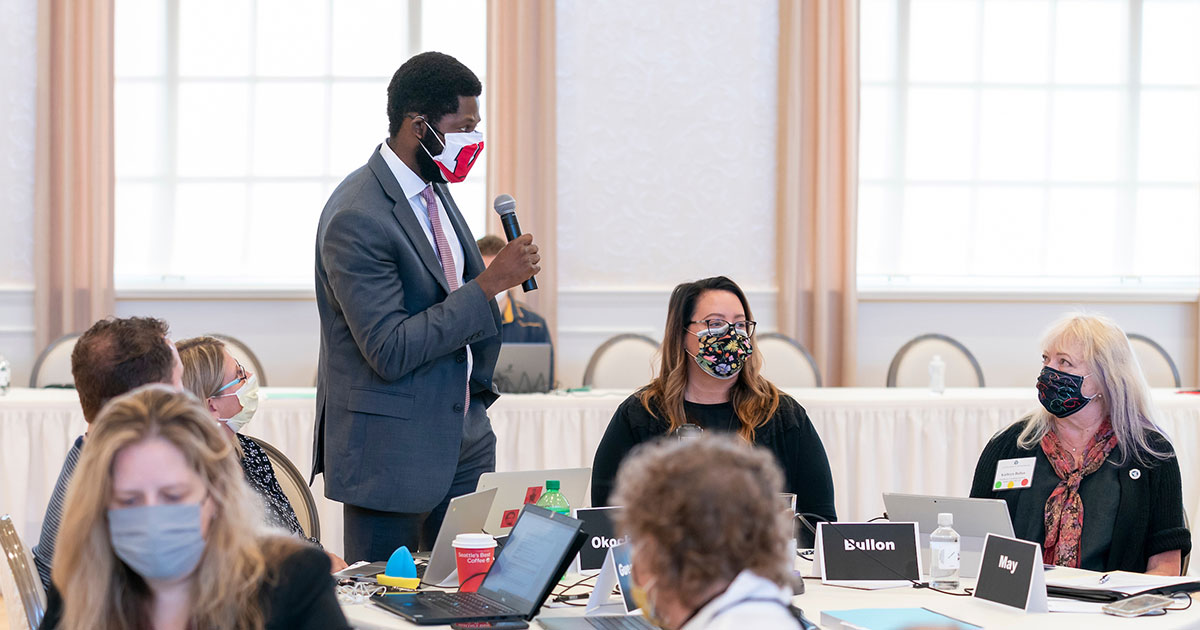
Nonresident Lawyer Division representative Kene Okocha of Washington D.C. speaks at the State Bar's Kenosha Board of Governors meeting.
The proposed petition states that “[t]hose who interact with the civil justice system will benefit from the continued use of remote depositions not only during the final phases of the pandemic, but also on a permanent basis.”
Past State Bar President Christopher Rogers presented the proposal to the board, noting the court’s temporary emergency rule expires Dec. 1.
“For those that do trial work, I can’t put into words the importance that this order has had on our practices,” said Rogers, referring to the temporary emergency order that allows remote depositions. “Many of us would have been ground to a halt without this.”
Other board members voiced support, noting the cost savings and the efficiencies involved in allowing remote depositions on a permanent basis moving forward.
Rogers said the court requested that the State Bar and other interested groups review emergency rules before expiration to determine whether they should be made permanent to improve the administration of justice in Wisconsin.
The proposed rule change, vetted by every county bar in the state, as well as the State Bar’s Family and Litigation sections, will be presented to the supreme court for review.
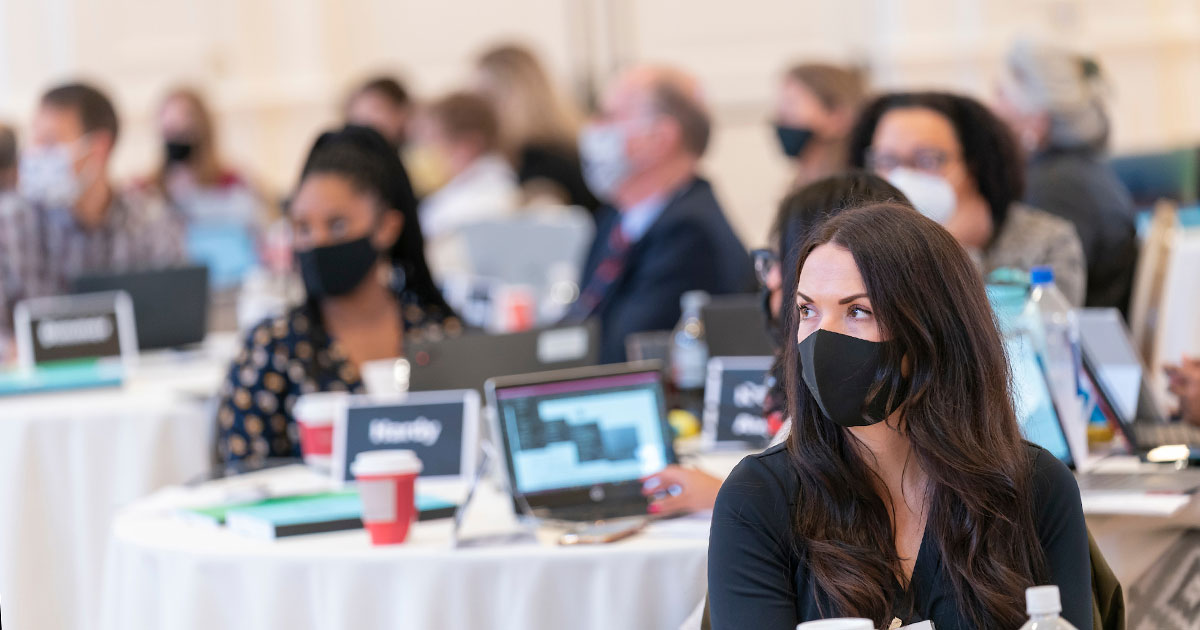
In a sign of the COVID times, board members listen to discussion with face coverings. Pictured here is Dist. 6 Gov. AnnMarie Sylla of Waukesha.
Board Supports Ethics Petition
The board supported a proposal from the State Bar’s Professional Ethics Committee to adopt ABA Model Rule 8.4(g) into Wisconsin’s attorney ethics rules. The proposal will now move to the Wisconsin Supreme Court as a petition. The proposed rule states:
It is professional misconduct for a lawyer to … (g) engage in conduct that the lawyer knows or reasonably should know is harassment or discrimination on the basis of race, sex, religion, national origin, ethnicity, disability, age, sexual orientation, gender identity, marital status or socioeconomic status in conduct related to the practice of law.
This paragraph does not limit the ability of a lawyer to accept, decline or withdraw from a representation in accordance with Rule 1.16. This paragraph does not preclude legitimate advice or advocacy consistent with these Rules.
The board discussed the proposal at its June meeting. The proposal – presented by emeritus U.W. Law Professor Ben Kempinen, chair of the State Bar’s Professional Ethics Committee – is intended to improve the legal profession’s commitment to diversity, inclusivity, and equal justice.
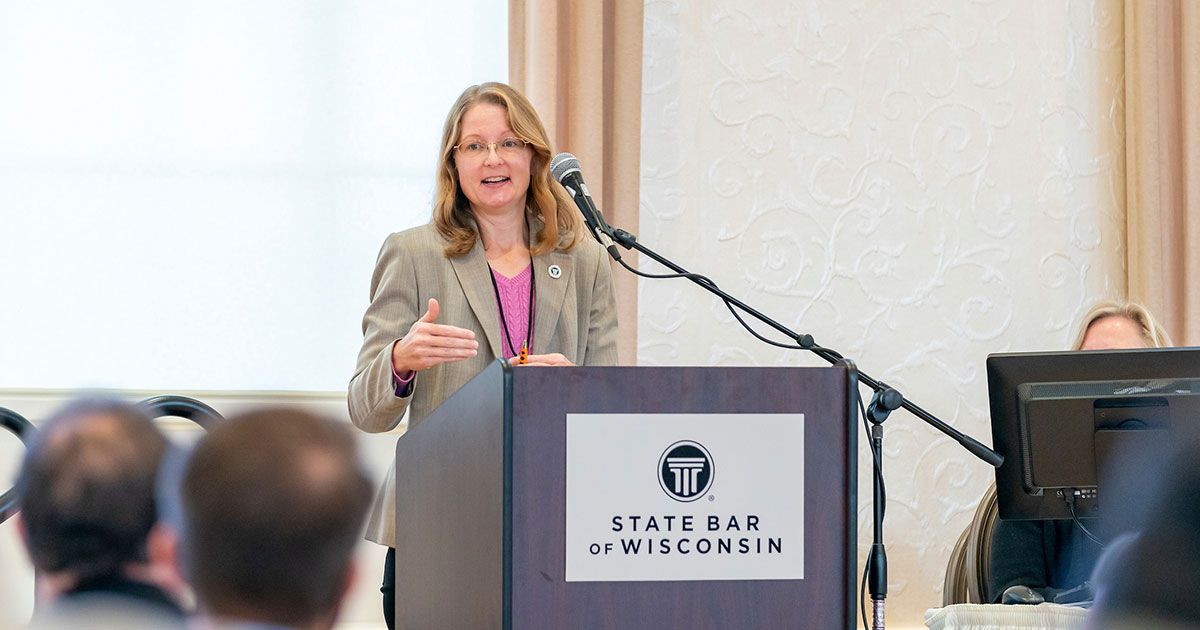
Past State Bar President Jill Kastner, who helped lead a Kenosha expungement clinic Sept. 21, gave a report on the continuing work of the State Bar's Racial Justice Task Force.
In 2019, then-State Bar President Jill Kastner tasked all State Bar committees to consider ways in which the State Bar could improve diversity, inclusion, and equity within the profession. The ethics committee’s proposal was a result of that charge.
The model rule would replace SCR 20:8.4(i), which says it is professional misconduct for an attorney to “harass a person on the basis of sex, race, age, creed, religion, color, national origin, disability, sexual preference or marital status in connection with the lawyer's professional activities,” with an exception for “legitimate advocacy.”
The Professional Ethics Committee noted that more than half the states address discrimination and harassment in their ethics rules. Although Wisconsin’s current rules expressly prohibit “harassment,” the change would also prohibit “discrimination” and expand the protected classes to include gender identity and socio-economic status.
A violation would occur only if the lawyer “knows or reasonably should know” their behavior rises to the level of harassment or discrimination. The committee noted that in most cases, discipline derives from intentional and egregious conduct. The current rule, which prohibits harassment, is a strict liability provision that applies regardless of intent.
In addition, the provision would regulate “conduct related to the practice of law,” not just conduct “in connection with the lawyer’s professional activities.”
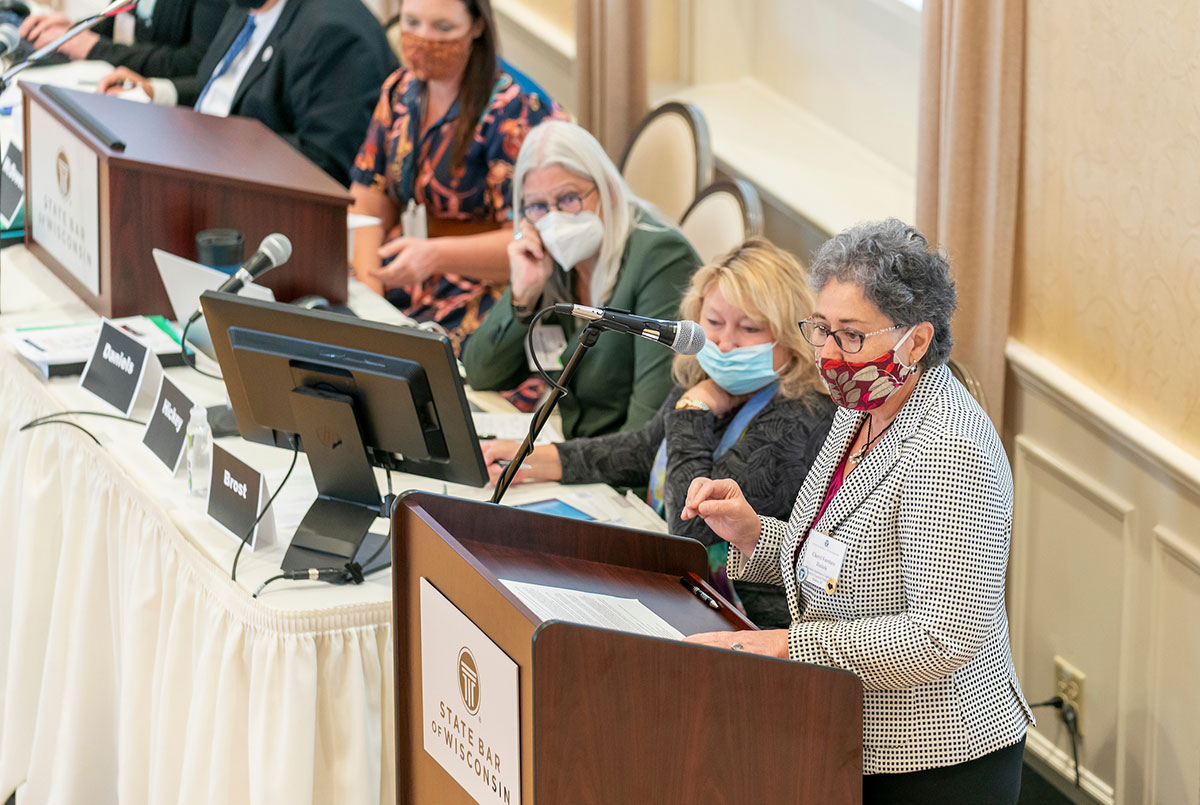
State Bar President Cheryl Daniels updated the Board of Governors on her priorities for the year.
Board Approves Nomination Committee
The board approved State Bar President Cheryl Furstace Daniels’ appointments to the Nomination Committee, which identifies candidates to serve in State Bar officer positions, including State Bar president-elect.
Daniels’ appointments to the 2022 State Bar election committee include: President-elect Margaret Hickey (Milwaukee); Secretary Kristen Hardy, Dist. 8 Gov. Joel Skinner (Hudson), former State Bar President Bob Gagan (Green Bay); and Wisconsin Law Foundation President Margaret “Peggy” Herlitzka (La Crosse).
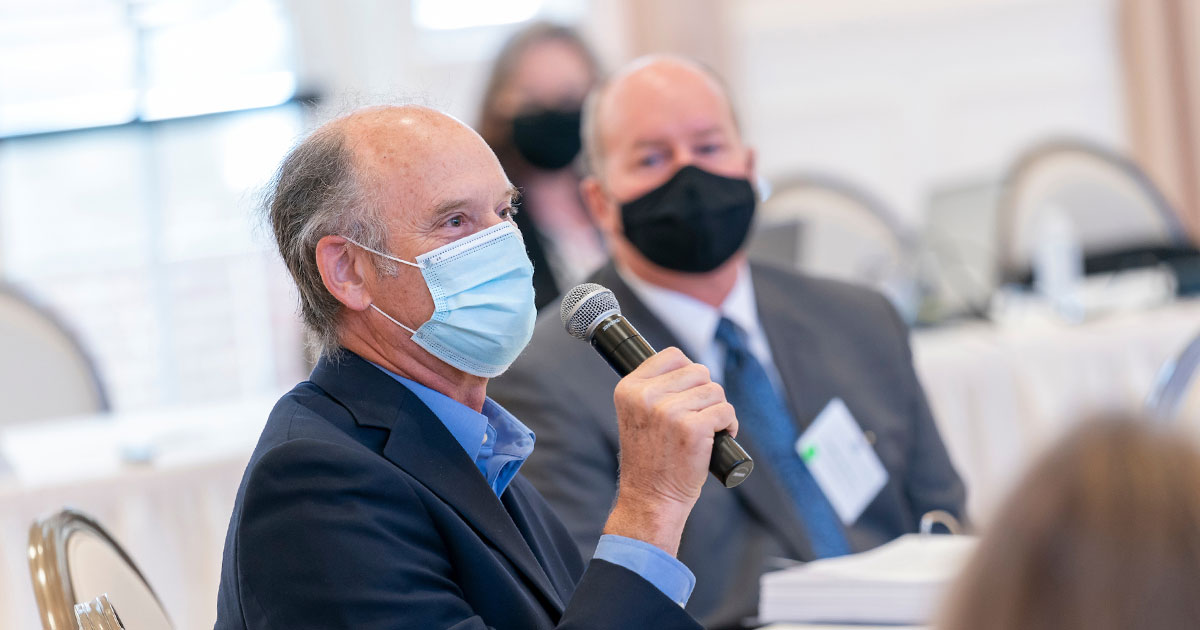
Dist. 8 Gov. Joel Skinner of Hudson was one of five members elected to the Nomination Committee for the State Bar's 2022 election cycle.
Other Business
The board approved requests from various State Bar sections to carry forward more than $10,000 in their operating budgets into the next fiscal year.
Dist. 2 Gov. Nick Zales (Milwaukee), as he has in previous years, noted that sections should limit their carryover amounts and spend the money on section members.
President-elect Margaret Hickey (Milwaukee) noted that different sections may have different reasons to carry forward larger amounts, such as planning for bigger events.
Upon request, interested members may obtain a copy of the minutes of each meeting of the Board of Governors. For more information, contact State Bar Executive Coordinator Jan Marks by
email or by phone at (608) 250-6106.or by phone at (608) 250-6106.
